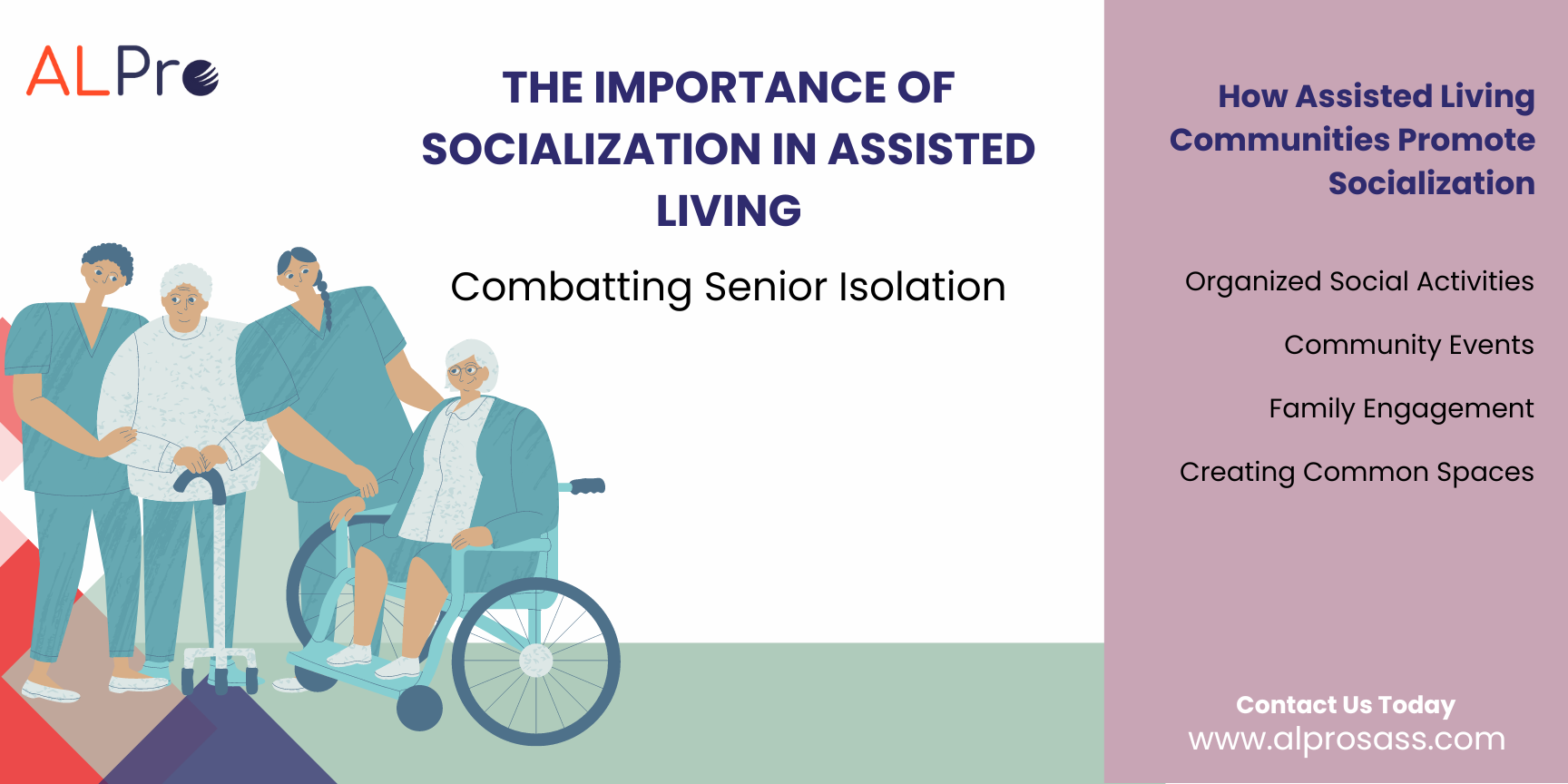The Importance of Socialization in Assisted Living - Combatting Senior Isolation

Social isolation is one of the most significant challenges seniors faces in Assisted Living communities. While Assisted Living facilities provide crucial physical care, addressing emotional and mental well-being is equally important. Loneliness and isolation can have severe consequences on seniors' health, contributing to depression, cognitive decline, and even physical ailments like high blood pressure or weakened immune systems.
In this context, socialization plays a significant role in strengthening the quality of life for seniors. Engaging in meaningful interactions through social activities, community events, and family engagement can significantly reduce the feelings of loneliness that many residents may experience. Let's explore how Assisted Living communities can foster connection and belonging, ultimately combating senior isolation.
The Impact of Isolation on SeniorsIsolation and loneliness are more than unpleasant feelings for seniors—they can have serious, long-lasting health effects. Research has indicated that social isolation may elevate the risk of developing chronic health conditions, cognitive decline, and depression. Research has equated the impact of isolation on health to the effects of smoking 15 cigarettes a day.
For Seniors, moving into an Assisted Living facility can often result in losing familiar surroundings, reduced social contact, and fewer opportunities for engagement. Without a strong sense of community, many older adults experience isolation, which diminishes their overall well-being.
The Role of Socialization in Senior Well-beingSocialization is critical to improving seniors' mental and emotional health. By offering opportunities for residents to connect with others, Assisted Living facilities can create a vibrant, supportive environment that promotes well-being. Social interaction stimulates the brain, reduces stress, and creates a sense of purpose, all essential for seniors to thrive.
Here's how socialization can positively impact seniors in Assisted Living:
Mental Health: Regular social interactions help reduce feelings of depression and anxiety. A strong social network provides emotional support and promotes a sense of belonging.
Cognitive Health: Engaging in conversation, games, and group activities stimulates cognitive functions, helping seniors maintain mental sharpness and delaying the onset of dementia or cognitive decline.
Physical Health: Socialization encourages physical activity, whether through group exercise classes, walking clubs, or recreational activities. Staying active with others improves physical health and mobility.
To combat isolation, Assisted Living communities must prioritize social activities, foster a sense of community, and encourage family involvement. Here are some of the ways they can do that:
Organized Social Activities and EventsMany Assisted Living facilities offer a calendar full of organized social activities to encourage resident engagement. These events range from game nights and movie screenings to art classes, book clubs, and cooking lessons. These shared activities allow residents to bond over common interests, create new friendships, and build connections that enhance their social well-being.
Examples of Social Activities:
Group exercise classes: Gentle yoga, tai chi, or water aerobics can help seniors stay active while providing a social outlet.
Cultural outings: Organized trips to museums, theaters, or local events can give residents a change of scenery and new experiences to share with others.
Hobby groups: Whether it's knitting, gardening, or painting, hobby groups allow residents to pursue their interests while connecting with peers who share similar passions.
Hosting community-wide events and celebrations is another effective way to encourage socialization among residents. These gatherings create a sense of belonging and camaraderie, helping seniors feel more connected to their peers and the facility's community.
Examples of Community Events:
Holiday Celebrations: Holiday parties, themed dinners, or seasonal events allow everyone to come together, fostering joy and connection.
Resident-led Clubs: Empowering residents to form and lead their own clubs or groups gives them ownership over their social activities and ensures they engage in activities they truly enjoy.
Volunteer Programs: Partnering with local schools or community organizations for intergenerational activities, where residents can volunteer or mentor younger individuals, provides meaningful interactions and boosts a sense of purpose.
Maintaining strong family connections is essential for seniors' emotional well-being. Assisted Living facilities can play an important role in encouraging family involvement, which helps residents stay emotionally grounded and supported.
Ways to Encourage Family Engagement:
Family Activity Days: Hosting events that include residents' families, such as family picnics, game nights, or workshops, helps bridge the gap between residents' lives in the facility and their family connections.
Flexible Visiting Hours: Offering flexible visiting hours allows family members to engage with their loved ones on their schedules, promoting consistent and meaningful contact.
Virtual Family Connections: With technological advancements, facilities can offer digital tools like video calls, allowing families who live far away to stay connected with residents regularly.
Physical space plays a remarkable role in promoting or inhibiting socialization. Assisted Living communities that design welcoming common areas—such as lounges, libraries, gardens, and dining rooms—create natural environments where residents can casually interact with each other throughout the day.
Designing Social Spaces:
Comfortable Seating Areas: Well-designed seating arrangements encourage residents to sit and engage in conversation with one another.
Outdoor Spaces: Gardens and patios provide a peaceful environment for residents to gather, promoting relaxation and informal social interactions.
Dining Halls: Communal dining spaces provide meals and serve as a social hub where residents can catch up with one another regularly.
Socialization in Assisted Living communities is essential for promoting emotional, mental, and physical well-being among seniors. By offering a wide range of activities, fostering a sense of community, and encouraging family involvement, Assisted Living facilities can help combat senior isolation and provide their residents with a vibrant, connected, and fulfilling life. As these communities evolve, prioritizing social engagement will remain a cornerstone of delivering high-quality care and enhancing residents' overall quality of life.
